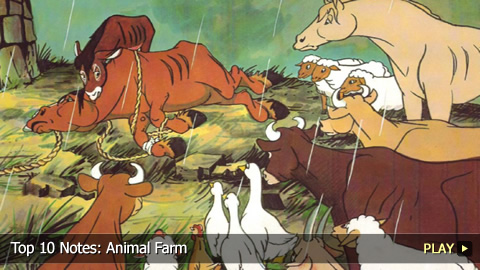Top 10 Notes: Animal Farm

#10: About the Author
Born 1903 in India, George Orwell dreamed of becoming a writer as a child and co-produced a magazine while attending college in England. After being part of the Indian Imperial Police in Burma and being a journalist in Paris, Orwell took up teaching while pursuing writing in England. But it was only after World War II that he earned international success with “Animal Farm” and “Nineteen Eighty-Four.” He died in 1950.
#9: Influences and Inspirations
Following his time in the Spanish Civil War, Orwell was inspired to write this allegorical and dystopian novel. He wanted to show the world that he felt Soviet Union leader Joseph Stalin was tainting the state and its socialist ideas. He also used elements of satire to blend politics and art.
#8: Settings and Era
Orwell set his novel on a farm after he saw a little boy whipping a carthorse and compared the situation to the way in which the wealthy take advantage of the working class. Though the story is set in England, the different animals Orwell used were meant to represent the different members of the Soviet Union’s working class.
#7: Plot
Narrated by an all-knowing third person, “Animal Farm” tells the tale of a group of farm animals that are ruled by pigs. After the death of their old leader, a boar named Old Major, the animals find themselves under the command of two young pigs named Snowball and Napoleon. The animals push Manor Farm’s human owner Mr. Jones off the land. Though the pigs educate and take care of the animals, Napoleon soon has Snowball driven away so he can take sole control. As the years go by, he treats the other animals more and more poorly, even if they help him win the attack from another farmer, Mr. Frederick. This includes making them extremely hard for empty promises, executing those he suspects of associating with his former co-leader and selling others who are too old, injured or unable to work. They eventually discover the pigs have become indistinguishable from humans.
#6: The Pigs: Napoleon and Snowball
Thanks to his speech-giving abilities, outgoing personality and creativity, Snowball becomes the original head of the farm. He represents real-life revolutionary Leon Trotsky and comes up with the idea to build a windmill. He’s an idealist; but the bigger, more intelligent, and more evil Napoleon has Snowball driven off the farm so he can be number one. The power-hungry tyrant uses dogs to do his bidding and a small pig named Squealer to make his commands known. As the novel’s villain, he represents Joseph Stalin.
#5: The Humans: Mr. Jones and Mr. Frederick
Mr. Jones is Manor Farm’s, later Animal Farm’s, human owner. He’s mean, rarely sober, and is thrown out by the rebelling animals. He symbolizes Russia’s last tsar, Nicholas II. When Mr. Frederick hears of what’s going at Animal Farm, he becomes afraid. So he attacks Napoleon and company and arranges a lumber deal with Napoleon. He symbolizes Adolf Hitler.
#4: Other Animals: Boxer and Benjamin, Old Major
Boxer is a strong, hard-working but naive carthorse. After sacrificing himself in the attack by Mr. Frederick, he becomes heavily injured. Instead of being rewarded for his loyalty, he ends up being slaughtered and represents the working class. Benjamin is an old, angry and distrustful donkey. Though he’s very knowledgeable about the farm, he doesn’t take much action because he doesn’t believe things will change no matter who’s in power. He also unsuccessfully attempts to save Boxer. As the farm’s previous leader, Old Major represents both Marx and Lenin, and serves as the source of the ideals the animals continue to uphold even after their pig leaders have betrayed them.
#3: Values and Themes
“Animal Farm”’s main theme revolves around how power corrupts and specifically how it corrupts a revolution. Related themes include the potential effects of an immoral leadership, narrow-mindedness, greed and dishonesty within a government and towards those being governed.
#2: Modern Popularity
Because of “Animal Farm”’s content, Orwell didn’t have an easy time getting it published. It’s since sold significantly well and is now considered one of the twentieth century’s finest English-language novels.
#1: Adaptations
Aside from radio and theatrical versions, “Animal Farm” has been adapted for the screen several times. This includes the animated 1954 film and the 1999 television movie.
Do you agree with our list? What’s your favorite piece of “Animal Farm” trivia? Be sure to subscribe to WatchMojo.com for more informative top 10s.
